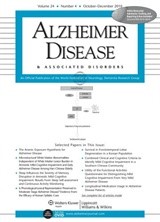The King-Devick (K-D) test is a 1 to 2 minute, rapid number naming test, often used to assist with detection of concussion, but also has clinical utility in other neurological conditions (eg, Parkinson disease). The K-D involves saccadic eye and other eye movements, and abnormalities thereof may be an early indicator of Alzheimer disease (AD)-associated cognitive impairment. No study has tested the utility of the K-D in AD and we sought to do so. The sample included 206 [135 controls, 39 mild cognitive impairment (MCI), and 32 AD dementia] consecutive subjects from the Boston University Alzheimer’s Disease Center registry undergoing their initial annual evaluation between March 2013 and July 2015. The K-D was administered during this period. Areas under the receiver operating characteristic curves generated from logistic regression models revealed the K-D test distinguished controls from subjects with cognitive impairment (MCI and AD dementia) [area under the curve (AUC)=0.72], MCI (AUC=0.71) and AD dementia (AUC=0.74). K-D time scores between 48 and 52 seconds were associated with high sensitivity (>90.0%) and negative predictive values (>85.0%) for each diagnostic group. The K-D correlated strongly with validated attention, processing speed, and visual scanning tests. The K-D test may be a rapid and simple effective screening tool to detect cognitive impairment associated with AD.
Summary Points:
- Current estimates indicate 5.3 million Americans are living with AD and the prevalence is expected to rise exponentially over the next 2 decades.
- A brief, non-invasive test that is rapid and easy to administer, and is sensitive to detection of MCI and AD dementia would be optimal for primary care or similar settings.
- Saccadic eye movement impairments are one of the most commonly documented forms of oculomotor dysfunction in AD patients.
- The objective of this study was to examine the utility and accuracy of the K-D in a sample of cognitively healthy older adult controls, and individuals with MCI and AD dementia from the Boston University Alzheimer’s Disease Center participant registry.
- The study revealed significant differences on the K-D total time score across the diagnostic groups as well as total errors. Both MCI and AD dementia subjected performed worse than controls on the K-D.
- The K-D was an effective measure for identifying cognitive impairment and distinguishing between patients with MCI and AD dementia from healthy older adults.
- The K-D performed equally well in detecting MCI and AD dementia from controls and therefore supports its utility in the detection of subtle cognitive impairment, and its application is not limited to severe forms of cognitive impairment.
- The K-D Test evaluates processing speed and visual tracking and performance on the test is dependent on saccadic eye movement.
- The K-D is an ideal test for many clinicians and clinical researchers in high patient and research subject volume settings.
- In addition to being brief and inexpensive, the K-D test requires minimal training to administer or interpret.
- The K-D was highly correlated with other well-established and validated neuropsychological measures of attention, visual tracking, and processing speed. Given that these measures assess mental abilities that overlap with those required for the K-D, the study provides evidence for good convergent validity for the K-D Test.
- The accuracy of the well-validated neuropsychological tests in detecting cognitive impairment improved in the presence of the K-D, highlighting the additive clinical utility of this measure.
The K-D is a brief and easily administered test that may be an effective tool to detect cognitive impairment. Findings suggest that the K-D may be an appropriate screening measure in fast-pace clinical settings, such as primary care offices, to assist in the early detection of cognitive impairment and guide referral for more comprehensive evaluation to ultimately facilitate early intervention.

